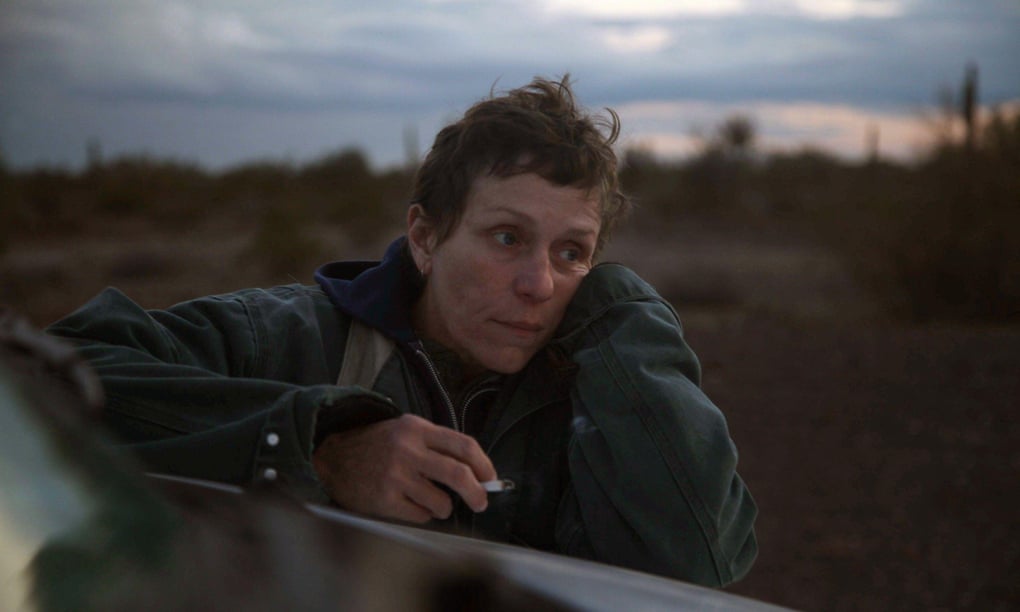From cowboys to ‘van-dwellers’, itinerant Americans are often portrayed as heroic lone wolves. Chloé Zhao’s film shows that the truth is more complicated and less glamorous
It has been a wild ride for Nomadland, Chloé Zhao’s roving portrait of the US’s rootless modern migrants. Shot for $5m and largely featuring amateur actors, it is the little movie that could: this year’s rags-to-riches story, beloved by the critics and odds-setters alike. The road has been cleared, the gold rush is on, but the Hollywood happy ending feels at odds with the film. As Nomadland steers its westerly course – from the Baftas in London to the Oscars in Los Angeles – it is living a dream that it knows is a lie.
Condé Nast Traveler called it “a love letter to America’s wide open spaces”, which is true up to a point, but this ignores the pathos, poverty and desperation at its core. Adapted from Jessica Bruder’s nonfiction bestseller, the film bounces Frances McDormand’s hard-bitten loner through a modern American badland in which the saloon and the sheriff’s office have been replaced by the RV park and the Amazon warehouse. I would file the film as an anti-western, a wholesale repudiation of manifest destiny, the pursuit of happiness, all the Hollywood snake oil we have long been fed. “Yeah, OK,” Bruder says. “But it’s more complicated than that.” Frustratingly, I think she may be right.
For Bruder, at least, the journey is almost done. She first reported on the US’s “van-dweller” or “workamper” community for Harper’s magazine, which laid the ground for her 2017 book. She is serving as a consulting producer and, from time to time, a spokesperson for the picture as it trundles through awards season. Bruder likens the experience to moving a bucket of water from one place to the next. Lots of responsibility. Lots of potential for spillage.
Nomadland clears centre stage for an invented heroine: Fern, a widow who takes to the road claiming that she is “not homeless, just houseless”, shuttling from one seasonal gig to the next. But the film folds her in with several of the nomads from Bruder’s book, all playing versions of themselves. These include white-bearded Bob Wells, the founder of the Rubber Tramp Rendezvous (RTR) – probably the largest gathering of nomads in the world – and the no-nonsense survivor Charlene Swankie, who bustles across the RTR’s campsite with her arm in a sling. Linda May dreams of buying a plot of land and building an earthship – a sustainable, self-sufficient home made from natural and recycled materials. Until then, she is stuck with the Squeeze Inn, her 9ft x 6ft (2.7m x 1.8m) trailer, broiling through the summers, freezing through the winters; another zero-hours tiddler in the US’s growing low-cost labour pool.
In researching Nomadland, Bruder trailed the migrants between the beet fields of North Dakota and the camp grounds of California in her own camper van. Most, she says, were keen to frame the lifestyle in the soaring rhetoric of the old west. They cast themselves as outlaws, cowboys, pioneers. They spoke of freedom and opportunity, individualism and self-reliance. Only later did she start hearing about all the rest: the lost jobs, ruinous divorces and foreclosed homes that put them on the road to begin with. They printed the legend, then they told her the facts. “The initial stories gave them a sense of agency,” Bruder says. “We all look to stories to understand what we are doing. But stories are always an imperfect match.”
continues, link in title...
Nowhere like home
Nowhere like home
“If you trust in yourself, and believe in your dreams, and follow your star. . . you'll still get beaten by people who spent their time working hard and learning things and weren't so lazy.”
